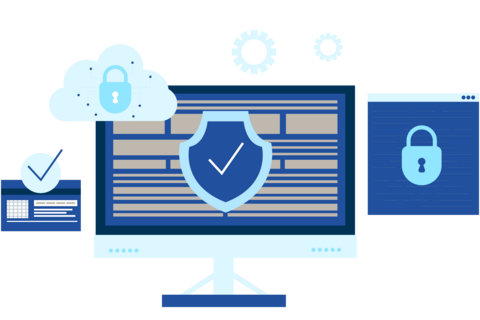In This Issue
- Using Money Smart to Build Cybersecurity Awareness
- Success Story
- Submit Your Money Smart Success Story
We welcome your submissions at ConsumerEducation@fdic.gov.

Using Money Smart to Build Cybersecurity Awareness
Internet crimes and cyber intrusions are becoming increasingly common with criminals aiming to steal money and identities. Financial educators are uniquely positioned to help people guard against these threats.
The FDIC’s Money Smart curriculum is a comprehensive resource that includes instructor guides, participant guides, scripts, and slides. These tools equip educators to teach people how to recognize scams, understand how fraudsters operate, and take steps to protect their finances.
For example, Money Smart for Older Adults helps older adults and caregivers spot and avoid scams such as telephone, internet, and investment fraud.
By incorporating these resources into your education efforts, you can strengthen cybersecurity awareness and support safer financial decision-making.
Explore more at fdic.gov/moneysmart.
Success Story
This month, we interviewed Jennell Huff, CRA/Community Outreach Coordinator from Bank of the Rockies and Money Smart Alliance member. Her team tailors Money Smart to each audience—most often Money Smart for Older Adults (MSOA) and Money Smart for Young Adults (MSYA) to meet the needs of both community members and students across rural Montana.
How does Bank of the Rockies use Money Smart?
“We adapt it (Money Smart) case-by-case. For older adults, we use MSOA materials during outreach and events, and we keep printed resources on hand for customers who have questions. In schools, I bring MSYA Participant Guide handouts, so students have something tangible to study and refer back to."
How often do you use Money Smart, and who typically participates?
“In my community, it ranges from one to ten sessions a year, usually about an hour each. Group sizes run from one-on-one up to twenty students. We reach students through business, math, and government classes, and we also share Money Smart with youth groups like 4-H (youth development organization), Future Farmers of America, and Business Professionals of America, helping young people connect financial education to real-life decisions.”
Can you share a recent success story that stood out?
“After a high-school business class where we covered the basics of checking, savings, money markets, and certificates of deposit or CDs using Money Smart, a parent came into the bank the next day to say their child had gone home excited about what they learned. The parent told us that it was the first time their child had come home eager to talk about school. That kind of feedback is incredibly meaningful.”
How do you distribute Money Smart resources to your community?
“When fiduciary accounts are opened, our staff provide appropriate MSOA resources. For World Elder Abuse Awareness Day, we encourage our new accounts representatives to offer MSOA workbooks and order copies for customers who prefer printed materials. In schools, I tailor MSYA content to the teacher’s request and use handouts so students can review and even be quizzed later.”
What advice would you share with other financial educators?
“For new presenters, the guides can be used as-is. For experienced educators, Money Smart can be combined with other trusted resources to create engaging, customized lessons. I encourage questions throughout sessions—and I’ve even seen teachers learn something new alongside their students.”
Do you report these activities for Community Reinvestment Act (CRA) purposes?
“Yes. We track and report our community education sessions and list the Money Smart materials we use. It supports our CRA reporting and reinforces our commitment to financial education.”
Send us your Money Smart success story to ConsumerEducation@fdic.gov. We look forward to highlighting your programs in a future edition of this newsletter.
For more consumer resources, visit FDIC.gov, or go to the FDIC Knowledge Center. You can also call the FDIC toll-free at 1-877-ASK-FDIC (1-877-275-3342). Please send your story ideas or comments to ConsumerEducation@fdic.gov. You can subscribe to this and other free FDIC publications to keep informed!
